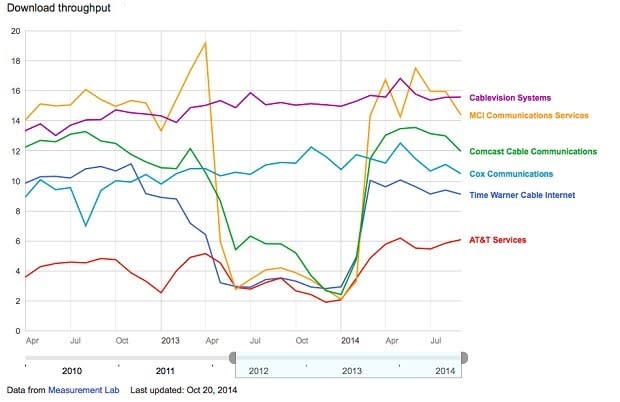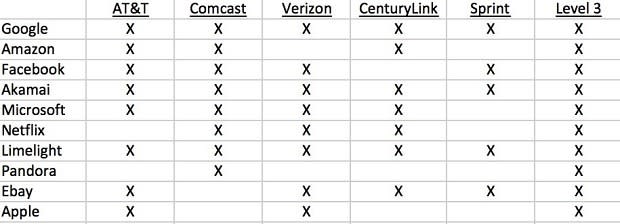Give thanks they haven't forced net neutrality yet
In February of this year a scandal emerged around the performance of Netflix on certain ISPs. The implication was that the ISPs were bullying poor, scrappy little Netflix into paying more to send Internet traffic on the ISP networks. Only rigorous, government-enforced net neutrality could stop such heinous behavior.
It's all lies.
The chart below, by Dan Rayburn on StreamingMediaBlog.com, shows what happened, although not why. (The data is based on a report entitled "ISP Interconnection and its Impact on Consumer Internet Performance" by Measurement Lab.)

Image via StreamingMediaBlog.com
As Rayburn tells, suddenly:
But not all ISPs; Cablevision and Cox, which had Open Connect connections with Netflix, did not experience the same decline.
What's hot on ZDNet
Samsung Galaxy Note Edge review: Stroke of genius in a black slab world
Updated: The best Android and Windows tablet deals of Black Friday 2014
'Life is pretty good here for IT people': Where techies earn five times the average salary
There are many content producers on the Internet, but nobody is in a class with Netflix. In the evenings, during Netflix rush hour, Netflix content, nearly all downstream, constitutes about one third of all broadband Internet traffic. The classic Internet routing system was not designed for this sort of volume. That's why direct connections from Netflix to the major ISPs are the only way to keep the traffic moving to customers adequately.
The rapid and simultaneous changes you see in the chart for performance on multiple, separate ISP networks points to an outside, common factor as a cause, and indeed there was one: Cogent, an intermediate of Transit ISP that has Netflix as a customer. Connections to the three major ISPs across Cogent were severely degraded during the time period indicated in the chart. Cogent had begun prioritizing the traffic of its retail customers over that of its wholesale customers, including Netflix, during times of heavy network usage that strained Cogent's capacity to deliver the traffic being pulled by end-users.
Netflix didn't have to use Cogent and the second change in the chart above corresponds to the time they moved traffic elsewhere. But in the end, direct interconnect is the only way to go for a company like Netflix. It's a common technique in the business, as StreamingMediaBlog.com once again shows:

image via StreamingMediaBlog.com
The other even bigger lie that's told to sell net neutrality, that ISPs could censor those they disagree with, is the worst kind of fearmongering, and there isn't even a false example like the one above to point to. ISPs have no interest in doing anything like that and all the big ones have stipulated to rules prohibiting them from blocking content in that way. And yet people like Al Franken still call net neutrality a First Amendment issue.
The supposed solution to the supposed problem, reclassifying broadband Internet service as a telecommunication service under the Federal Communications Act, would subject ISPs to the same level of regulation that made the phone system so innovative for all those years. Imagine them having to get permission to change a feature or add a service. And all to solve a problem that doesn't exist.
I know I give thanks this year that we haven't completely screwed up our Internet service in this country yet by applying a Depression-era law to it.
Hat tip to Larry Downes on Forbes.com.


